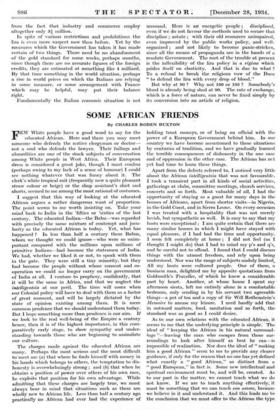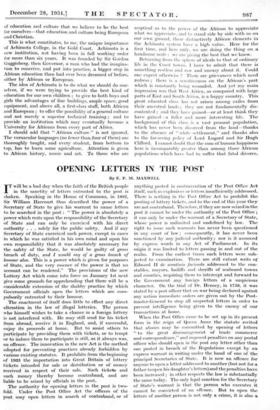SOME AFRICAN FRIENDS
By CHARLES RODEN BUXTON
FEW White people have a good word to say for the educated African. Here and there you may meet someone who defends the native clergyman-or doctor— not a soul who defends the lawyer. Their failings and absurdities are one of the stock subjects of conversation among White people in West Africa. Their European dress is considered a great joke, though I must confess (perhaps owing to my lack of a sense of humour) I could see nothing whatever that was funny about it. The clerk's white tropical suit (frequently now a quite pleasant straw colour or beige) or the shop assistant's shirt and shorts, seemed to me among the most rational of costumes.
I suggest that this way of looking at the educated African argues a rather dangerous want of proportion. The point seems to me worth insisting on. Take your mind back to India in the 'fifties or 'sixties of the last century. The educated Indian—the Babu—was regarded with precisely the same mixture of contempt and jocu- larity as the educated African is today. Yet, what has happened ? In less than half a century these Babus, whom we thought we could ignore—who were so unim- portant compared with the millions upon millions of primitive Indians—had become the statesmen of India. We had, whether we liked it or not, to speak with them in the "gate. They were still a tiny minority,•but they had become the people without whose consent and co- operation we could no longer carry on the government of India at all. I venture to prophesy, confidently, that it will be the same in Africa, and that we neglect the intelligentsia at our peril. The time will come when our Colonial policy will have to deal with them as a factor of great moment, and will be largely dictated by the state of opinion existing among them. It is mere common prudence that we should understand them today. But I hope something more than prudence is our aim. If we look to the real well-being of the Empire a century hence, then it is of the highest importance, in this com- paratively early stage, to show sympathy and under- standing towards those who are beginning to assimilate our culture.
The charges made against the educated African are many. Perhaps the most serious and the most difficult to.meet are (a) that where he finds himself with money in his hands which belongs to others, the temptation to dis- honesty is overwhelmingly strong ; and (b) that when he obtains a position of power over others of his own race, he exploits that position for his own advantage. While admitting that these chardes are largely true,' we must always bear in mind that situations such as these are wholly new to African life. Less than half a century ago practically no African had ever had the experience of holding trust moneys, or of being an official with the power of a European Government behind him. In our country we have become accustomed to these situations by centuries of tradition, and we have gradually learned the terrible consequences of dishonesty in the one case and of oppression in the other case. The African has not yet had time to learn, these things.
Apart from the defects referred to, I noticed very little about the African intelligentsia that was not favourable. I took a transient part in all kinds. of social activities, gatherings at clubs, committee meetings, church services, ' concerts and so forth. Most valuable of all, I had the opportunity of staying as a guest for many days in the houses of Africans, apart from shorter visits—in Nigeria, in the Gold Coast, and in Sierra Leone. On every occasion I was treated with• a hospitality that was not merely lavish, but sympathetic as well. It is easy to say that my hosts were exceptional ; I am quite certain that there are many similar houses in which I might have stayed with equal pleasure, if I had had the time and opportunity. I soon felt completely at. home ; I did not feel (as I thought I might do) that I had to mind my p's and q's, and be careful not to offend. I found that I could discuss things with the utmost freedom, and rely upon being understood. Nor was' the range of subjects unduly limited, All my hosts were cultured people. One of them, a 'business man, delighted me by apposite quotations from Goldsmith's Traveller, of which he knew a considerable part by heart. Another, at whose house I spent my afternoon siesta, left me entirely alone in a comfortable bedroom, only sending in by his ,servant two agreeable things—a pot of tea and :a copy of Sir Will Rothenstein's Memoirs to amuse my leisure. I need hardly add that in outward matters, food, sanitation and so forth, the standard was as good as I could desire.
As to our own relations with the educated African, it seems to me that the underlying principle is simple. The ideal of " keeping the African in his natural surround- ings "-leaving the man who escapes from those sur- roundings to look after himself as best he' can—is impossible of realization. Nor does the ideal of " making him a good African " seem to me to provide any clearer guidance, if Only for the reason that no one has yet defined what exactly a " good African," as distinct from a " good European," in fact is. Some new intellectual and spiritual environment must be, and will be, created. As to our part in the matter, we cannot teach what we do not know. If we are to teach anything effectively; it must be something that we can teach con aritore, because we believe in it and understand it. And this leads me 'to the conclusion that we must offer to the African the type of education and culture that we believe to be the best for ourselves—that education and culture being European and Christian.
This is what constitutes, to me, the unique importance of Achimota College, in the Gold Coast. Achimota is a new institution, not having been in full working order for more than six years. It was founded by Sir Gordon Guggisberg, then Governor, a man who had the imagina- tion to conceive, and put into practice, a bigger step in African education than had ever been dreamed of before, either by African or European.
The idea of Achimota is to do what we should do our- selves, if we were trying to provide the best kind of education for our own children ; to give to both boys and girls the advantages of fine buildings, ample space, good equipment, and above all, a first-class staff, both African and European ; to offer the possibility of a general culture and not merely a superior technical training ; and to provide an institution which may eventually become a University for Africans from every part of Africa.
I should add that " African culture " is not ignored. The vernacular languages (no fewer than,four of them) are thoroughly taught, and every student, from bottom to top, has to learn some agriculture. Attention is given to African history, music and art. To those who arc sceptical as to the power of the African to appreciate what we appreciate, and to stand side by side with us on our own ground, these distinctively African elements in the Achimota system have a high value. Here for the first time, and here only, we are doing the thing on a handsome scale : we are giving the best that we know. Returning from the sphere of ideals to that of ordinary life in the Coast towns, I have to admit that there is something restless and raw and uneasy about it. Could one expect otherwise ? There are grievances which need redress ; there is a sensitiveness on the African's part which is constantly being wounded. And yet my main impression was that West Africa, as compared with large parts of East and South Africa, is a happy country. This great educated class has not arisen among exiles from their ancestral lands ; they arc not fundamentally dis- contented ; and they have gained—or at least think they have gained—a fuller and more interesting life. The background of this class is a vast peasant population, which has never been divorced from the land—thanks to the absence of " white settlement," and thanks also to the far-seeing policy of Lord Lugard and Sir Hugh Clifford. I cannot doubt that the sum of human happiness here is incomparably greater than among those African populations which have had to suffer that fatal divorce.



































 Previous page
Previous page